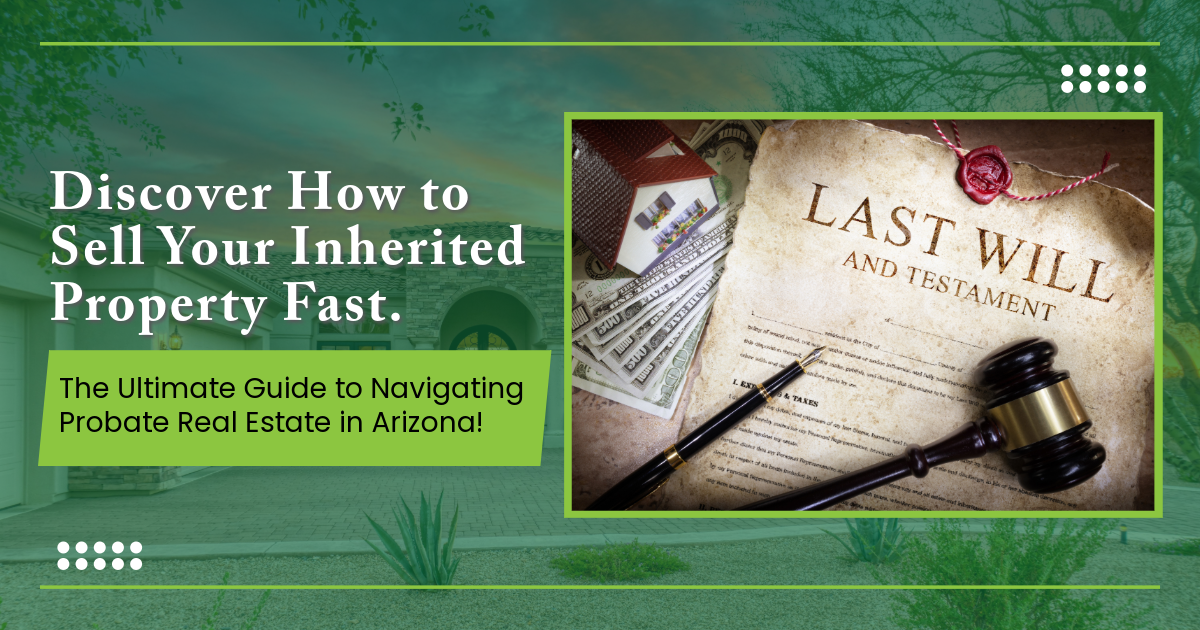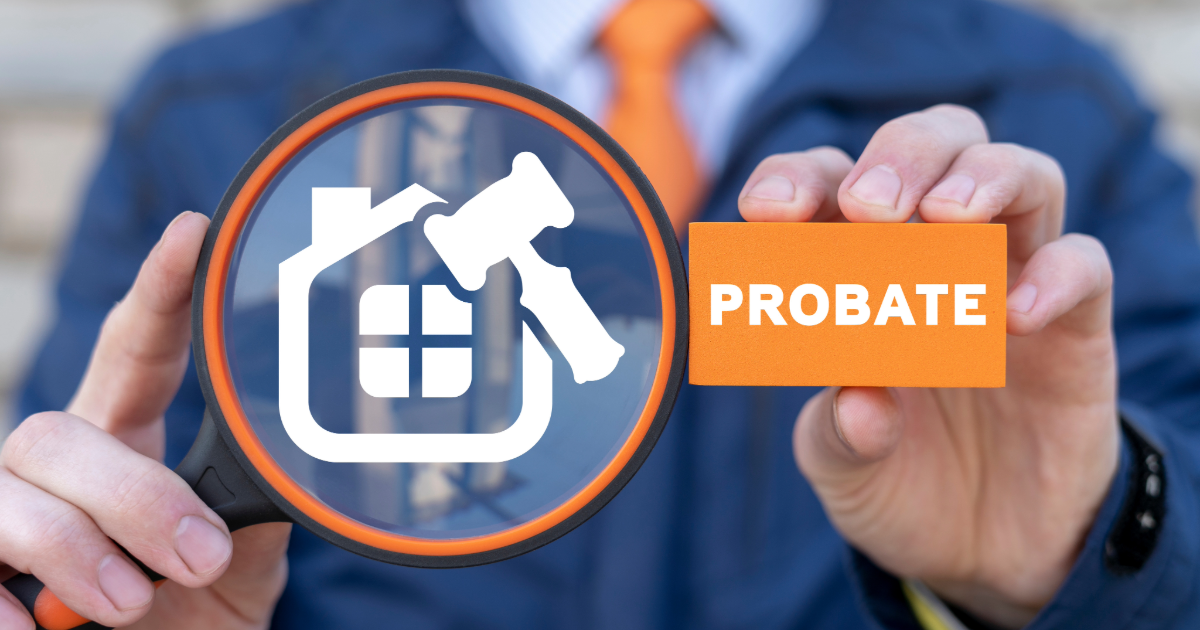Discover How to Sell Your Inherited Property Fast: The Ultimate Guide to Navigating Probate Real Estate in Arizona!

Chances are, you’ve got a lot going on these days.
Losing a loved one is emotionally devastating, making it difficult to manage daily life. The administrative tasks that follow, such as sorting through belongings, managing accounts, and dealing with legal documents, add significantstress. Handling personal and sentimental items, as well as ensuring pets and dependents are cared for, further complicates the process.
Probate is essential in Arizona for settling a decedent’s estate. It ensures the legal transfer or sale of real estate and proper management of other assets like bank accounts, investments, and personal belongings. Probate provides a structured process for distributing assets, paying debts and taxes, and avoiding legal disputes, offering clarity and peace during a challenging time. Seeking legal guidance can help navigate the complexities of probate effectively.
We know this is the last thing people want to deal with. So we provided some information about probate to help smooth the process.
Different Types of Probate in Arizona

Informal Probate
Informal probate happens when your loved one doesn’t make a valid will and the estate is not challenged. The designated personal representative manages the estate with limited court supervision. Informal probate proceedings are more straightforward, yet it is still advisable to seek competent legal counsel. In the absence of a valid will, we will proceed with an intestate succession according to probate law.
A personal representative initiates the probate process, and they will be responsible for any mistakes they make. Informal probate proceedings can become complex, and the assistance of a licensed professional attorney can be valuable.
Formal Probate
Formal probate is used by the court to address legal matters that arise regarding the estate. For instance, if there are conflicting interpretations of a will, doubts about the legitimacy of a will, or if there is an argument over the appointment of a personal representative. It’s also utilized when there is no estate planning.
Probate involves more than just filing documents to the probate court; it requires additional comprehensive steps.
Supervised Probate
It is where the court looks after every step of the probate procedure. This implies that the personal representative must obtain the court’s approval before taking any action, such as distributing assets. You can request this form of probate to protect your rights as a creditor, inheritor, or other interested party.
Supervised probate is also required when a minor is among the beneficiaries. The court will protect the interest of the minor under all circumstances.
The Probate Process in Arizona

The probate process can be overwhelming if you do it alone.
To simplify the process, here is a step-by-step guide on how to initiate probate for an Arizona estate.
Read the Decedent’s Last Will
After taking time to grieve and mourn your loss, check for the Last Will and Testament and read the will. Also, verify if there is a trust or any other legal arrangements in place to avoid probate. It’s always a good idea to involve a probate attorney in the case of un-expectancies, difficulties navigating information or high conflict. Make sure the original file is safe since the probate court will need to validate it.
If there is no Will, the probate process will still be required if the probate meets the threshold. Someone will need to review all the deceased’s assets and all the estate assets, examine bank accounts, inspect any deeds to see how they were filed, search for any property that is held in joint tenancy, and review retirement accounts. Probate involving a blended family can be especially challenging as well.
The court must confirm the decedent was over 18, of sound mind and not under undue influence when the will was written. They’ll also verify that the decedent and their two witnesses accurately signed and dated the document. What’s more, they’ll confirm the document notarization. In Arizona, having the will properly witnessed and notarized only makes the Will self-proven.
Determine the Personal Representative
In most cases, the personal representative is the individual designated as the executor in the will. If the executor named in a will is unable to serve, probate laws in Arizona specify the set following priority order for individuals who may apply for the position.
This also may apply if a will exists.
- A surviving spouse of the decedent who inherits real property under the will
- Other heirs of the decedent such as adult children, siblings, or parents
- A surviving spouse
- Other individual heirs of the decedent
- The decedent was a veteran or child or partner of a veteran
- Any creditor—except for a funeral establishment owner or director
- A public fiduciary
The family should reach a consensus on the choice of executor. Otherwise the courts will appoint one.
Filing Documents with the Probate Court of your County
After the person is identified representative, they must apply to the court for a formal appointment to act on behalf of the estate. Also, they should submit a petition to the court to initiate the probate process.
Notification to Heirs and Creditors
After the appointment, the executor should notify all heirs to start probate. If there is a will, the heirs should receive a copy. Additionally, they need to notify all the possible creditors of the estate.
If there is no will, they will file a petition seeking administration of the estate. The notice of administration must be provided to all the decedent’s heirs and any family member who is a beneficiary.
Identifying Assets and Debts
Gather the decedent’s assets and compile an inventory. The process can be complex, since some assets may not be subject to probate.
The personal spokesperson should also think about the decedent’s debts. Once they’re done, they should come up with the inventory and appraisal of the property to the beneficiaries and other attentive parties like creditors.
Paying Debts and Taxes
The next stage of the process requires paying all the estate’s debts and paying creditors. These may include:
- Costs of administration, legal fees, and personal spokesperson fees
- Estate expenses like funeral costs
- Outstanding hospital, caregiver, or other medical expenses of the deceased person
- Loans
- Mortgages
- Utility bills
- Credit cards
- Estate taxes
- Any unsecured debts
The individual representative is essential to file tax returns. If there is not enough money to pay all creditors, the personal representative can sell some assets to get the obligatory funds and pay off the debts.
Accounting and Distribution of the Estate
After paying the debts and taxes, the personal representative comes up with a written accounting that details the delegation of assets and payments to the beneficiaries. The beneficiaries can also ask questions or make a complaint to the accountant.
Once all issues are settled, the personal representative assigns the residual assets according to the decedent’s wishes if there is a will. In case there is no will, they’ll dispense all the assets and property according to state intestacy statutes.
Financial Considerations and Executor Compensation.

Court Fees
- Probate involves filing fees paid to the court, which vary by jurisdiction.
- These fees are relatively fixed but should be accounted for early in the process.
Executor and Attorney Fees
- Executors are entitled to compensation for their time and effort.
- Probate attorney fees vary based on the estate’s complexity and the length of the process.
- In some places, such as Arizona, “ordinary” services are a percentage of the estate’s value, while “extraordinary” fees (e.g., litigation) are often charged hourly.
- All fees must receive approval from the probate court.
Taxes
- Estates may owe federal estate taxes, state estate or inheritance taxes, and income taxes on probate-generated income.
- Planning for these taxes and understanding deductions and credits are essential.
Appraisal and Valuation Costs
- Proper estate administration requires accurate valuation of assets, including real estate, personal property, and investments.
- Court-appointed probate referees perform professional appraisals, which incur fees.
Debts and Final Expenses
- The estate must pay the deceased’s outstanding debts and final expenses, such as funeral and burial costs.
- These expenses are settles before distributing assets to beneficiaries and can vary widely.
How much does Probate in Arizona cost?
Probate and settling an estate normally costs an average of $15,000.
Do I have to pay the personal representative?
Yes. Being an executor or individual representative takes a lot of arrangements, so they are normally compnesated by the estate in return. if your’re making all the effore for an estate in Arizona and have been desingated the representative or administrator, then that person is you!
Should I hire a lawyer for Probate in Arizona?
Lawyers can simply cost thousands of dollars through the estate settlement process, but if you know there is going to be a fight over any assets or have a complex estate, it is worth it. Handling high conflict pro se can result in an outcome that is undesired.
Conclusion
Effectively managing probate in Arizona is essential for the smooth transition of a deceased loved one’s assets. This structured legal process ensures real estate, bank accounts, investments, and personal belongings are properly handled, debts and taxes are paid, and assets are distributed according to the will or state law.
Given its complexity, seeking professional resources and legal counsel is highly recommended. Engaging with experienced professionals provides peace of mind and clarity, allowing you to focus on grieving and honoring your loved one’s memory.




